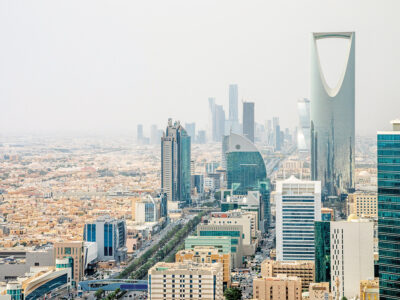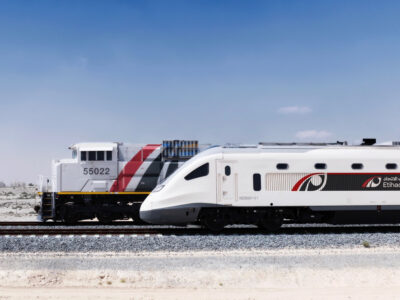The UAE has its sights fixed on becoming the financial centre of the Middle East. It intends to compete as a trading hub with New York, London, Hong Kong, and Singapore. And there are signs that they might not be far off.
When people think of Middle Eastern economies, they tend to think of oil. Yet many Arab nations have spent decades trying to pivot away from the ever-volatile substance – to varying degrees of success.
One of the most successful nations has been the United Arab Emirates – specifically Dubai. Way back in the 1970s, UAE Prime Minister Sheikh Rashid Bin Saeed Al Maktoum had a bold vision for Dubai, seeing a future beyond oil before many other neighbouring leaders. Today, oil production accounts for less than 1 percent of GDP, where once it stood at 50 percent.
The economy has successfully diversified into a variety of other sectors. Heavy investment into the city’s luxury real estate sector has seen the creation of the world’s tallest building and the Palm Islands. Meanwhile, forays into renewables have led to the creation of a solar park that could see Dubai 25 percent solar electrified by 2030.
Still, its reputation is lagging behind its innovation. And with the pandemic accelerating pressures on the UAE’s economy by having a severe impact on its non-oil economy, based on tourism and commerce, as well as reducing its oil income – Dubai remains in need of a central, sustainable money maker to confidently pin its future on.

From humble beginnings to regional hub
The UAE is on its way to creating a world-class financial ecosystem.
In 2021, the Dubai International Financial Centre (DIFC) reported a 25 percent increase in the total number of registered firms and is now home to 17 of the world’s top 20 banks, five of the top 10 insurance companies, and five of the top 10 asset managers. Figures which are expected to grow in 2022.
Dubai’s financial technology sector, in particular, is making it easier for new market entrants to become quickly established and is starting to turn the heads of ambitious global VCs, with the rapid, widespread adoption of blockchain technology, robotics process automation, and innovative payment technology.
There’s good reason for this activity. Dubai provides an ever-increasingly favourable environment for financial firms of all shapes and sizes, with world-class financial centres, innovation sandboxes as well as a favourable legal and regulatory regime.
More specifically, the authorities are also taking steps to make Dubai a trading hub for both professional and retail traders, setting up exchanges such as the Dubai Financial Market and the Dubai Gold and Commodities Exchange (DGCX) to support that ambition.
To attract more capital and increase volumes, these markets have decided to integrate with the global financial community and changed their trading days to Monday through Friday, instead of Sunday through Thursday (the standard work week for the region).
Adding to the hype, Dubai is also floating some of the country’s public infrastructure on 12 April 2022. The Dubai Water and Electricity Authority recently announced it will be selling a 6.5 percent stake of the business in the Dubai Financial Market (DFM).

The FX market, too, has taken leaps forward. And while tourism struggled, FX trading saw a significant increase in users and increase in trading volumes.
Compared to other markets in the Middle East, the UAE was the first to create the necessary infrastructure for forex trading, with sufficient technological and latency infrastructure, a trusted banking system, respectable regulators, and adequate liquidity providers.
All of these successes have reinforced that Dubai has the potential to attract a huge amount of trading activity.
Becoming a global trading hub
While Dubai may have the capital and some alluring factors, it remains far from world-renowned compared with the likes of London and New York, which remain the cornerstones of global capital markets.
On top of having the capital, the network of supporting talent and businesses, comprehensive infrastructure, and a mature regulatory environment, both cities enjoy the privileges that go along with a romantic narrative.
They are seen around the world as cities dripping in financial talent and future billionaires.
At the end of the day, the NYSE and LSE are commonly referred to by initials alone, unlike the DFM.
You can’t force that kind of world-renowned status. Right? Wrong.
Singapore is a prime example of a country in which relentless, state-led pursuit of financial sector dominance was successful.
Early on in its independence and acknowledging its lack of natural resources, Singapore’s Government saw the potential of financial services. Prime Minister Lee Kuan Yew, who served from 1959-1990, oversaw significant economic reforms and drove the diversification of the sector into new growth areas and turning Singapore an attractive destination for foreign investment.
With similar commitment and diversification, Dubai could achieve this too. It just needs to make sure it has the right ingredients to get there, including a fully transparent regime, the availability of trusted brokers and trading platforms, easy and straightforward funding and withdrawal pathways, as well as sophisticated technological infrastructure to allow for faster execution.
The ecosystem must also remain on the cutting edge. While Dubai is world-leading in certain blockchain technology, it is falling behind on crypto, which is an increasingly important element of both institutional and retail trading. Binance, for example, has only just been granted a virtual asset license.
The Securities and Commodities Authority (SCA) is purportedly moving closer to providing a regulatory and supervisory framework to control the UAE’s virtual asset business, but neighbouring Bahrain is already building its status as the regional crypto hub.
Creating a crypto friendly infrastructure that will allow Dubai to lead the regions crypto market should therefore be a top priority.
As in Singapore, stimulating the local financial and trading community is critical. In that way, education will be one of the most important ingredients to propel Dubai to global hub status and keep it there.
Local traders may not be underserved, but many lack the necessary knowledge and sophistication to engage fully and fruitfully with the local trading landscape. It is the responsibility of brokers to fill the gaps by providing a trusted trading ecosystem and the best possible services.
If they can do this, it will enable more investors to engage confidently with Dubai’s trading environment and stimulate its burgeoning economy by trading a growing number of UAE assets on the Dubai markets. If they can’t, investors and traders won’t be able to play their part in turning Dubai’s dreams of being a global trading hub into a reality.








